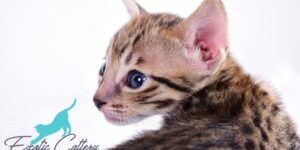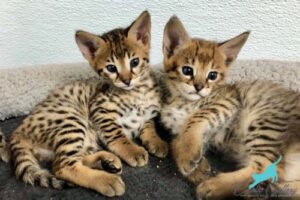Savannah Cat Breeds: The Ultimate Guide to Exotic Feline Companions
Are you intrigued by the allure of exotic cats but want the companionship of a domestic feline? Look no further than the Savannah cat breed. Known for their stunning, wild appearance and playful personalities, Savannah cats have captivated cat lovers worldwide. But what makes these cats so special? Did you know that Savannah cats can jump up to 8 feet high from a standing position? These extraordinary felines, a cross between domestic cats and wild African servals, have captivated the hearts of cat enthusiasts worldwide. But what makes them so unique, and are they the right pet for you?
Key Takeaways:
- Savannah cats are a hybrid breed combining domestic cats and wild African servals
- They possess remarkable athleticism, intelligence, and striking appearance
- Different generations of Savannah cats exist, each with unique characteristics
- Proper care, legal considerations, and ethical concerns surround Savannah cat ownership
The Origins of Savannah Cats
Savannah cats trace their roots back to the 1980s when breeder Judee Frank successfully crossed a domestic cat with a wild African serval. This groundbreaking experiment resulted in the birth of “Savannah,” the first F1 (first-generation) Savannah cat. Since then, the breed has gained popularity and recognition, officially acknowledged by The International Cat Association (TICA) in 2001.
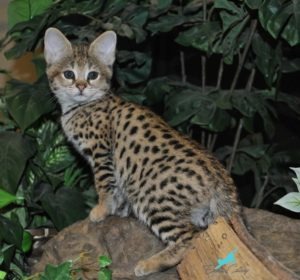
How to Vaccinate Your Savannah Cat
Quick Takeaway: Savannah cats are a relatively new breed with a fascinating origin story, blending wild and domestic feline genetics.
Understanding Savannah Cat Generations
Savannah cats are classified into different generations, denoted by the letter “F” followed by a number. The generation indicates how far removed the cat is from its wild serval ancestor.
| Generation | Serval Percentage | Characteristics |
|---|---|---|
| F1 | 50-75% | Most wild-like, largest size |
| F2 | 25-37.5% | Still quite wild, but more domesticated |
| F3 | 12.5-18.75% | More domestic traits, but retain wild features |
| F4 | 6.25-9.375% | Mostly domestic, but with distinct Savannah traits |
| F5 and beyond | <6.25% | Considered fully domestic Savannah cats |
Quick Takeaway: The lower the generation number, the higher the percentage of serval DNA, resulting in more wild-like traits and appearance.
Physical Characteristics of Savannah Cats
Savannah cats are known for their striking appearance, which sets them apart from other domestic cat breeds. Some key physical traits include:
- Size: Larger than average domestic cats, with males reaching up to 25 pounds
- Coat: Short, dense fur with bold spotted patterns
- Ears: Large, erect ears reminiscent of their serval ancestors
- Eyes: Almond-shaped eyes, often with a distinctive “teardrop” marking underneath
- Body: Long, lean, and muscular build
- Tail: Medium-length tail, often with black rings
Quick Takeaway: Savannah cats possess a unique blend of wild and domestic features, making them visually captivating and easily distinguishable from other breeds.
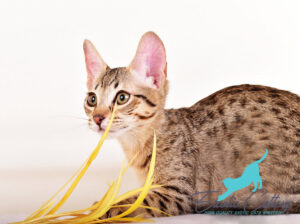
Are Savannah Cats Hypoallergenic?
Temperament and Personality
Savannah cats are known for their:
- Intelligence: Highly trainable and quick learners
- Energy: Require ample playtime and exercise
- Loyalty: Form strong bonds with their human families
- Curiosity: Love exploring and investigating their surroundings
- Sociability: Often enjoy the company of humans and other pets
“Savannah cats are not your typical lap cats. They’re more like dogs in a cat’s body – always ready for adventure and interaction.” – Dr. Sarah Johnson, Exotic Pet Veterinarian
Quick Takeaway: Savannah cats are energetic, intelligent, and social companions that require dedicated owners who can meet their unique needs.
Caring for a Savannah Cat
Diet and Nutrition
Savannah cats have specific dietary requirements due to their wild ancestry. A high-protein diet is essential, often including:
- Premium quality cat food (wet and dry)
- Raw or cooked meat (chicken, turkey, fish)
- Occasional treats like eggs or organ meats
Avoid: Grains, excessive carbohydrates, and human food not suitable for cats
Exercise and Enrichment
To keep a Savannah cat healthy and happy, provide:
- Vertical spaces (cat trees, shelves)
- Interactive toys
- Puzzle feeders
- Daily play sessions
- Safe outdoor access (if possible)
Grooming
Despite their exotic appearance, Savannah cats are relatively low-maintenance in terms of grooming:
- Brush weekly to remove loose fur
- Trim nails regularly
- Clean ears as needed
- Dental care (brushing teeth or dental treats)
Quick Takeaway: Proper care for Savannah cats involves a specialized diet, ample exercise opportunities, and regular grooming to maintain their health and well-being.
Legal Considerations and Ethical Concerns
Before considering a Savannah cat as a pet, it’s crucial to be aware of the legal and ethical implications:
- Legality: Some countries and regions have restrictions or bans on hybrid cat breeds. Always check local laws before acquiring a Savannah cat.
- Ethical breeding: Ensure you’re working with a reputable breeder who prioritizes animal welfare.
- Wildlife impact: Consider the potential impact on local ecosystems if a Savannah cat were to escape.
- Commitment: These cats require significant time, energy, and resources. Be prepared for a long-term commitment.
Quick Takeaway: Owning a Savannah cat comes with legal and ethical responsibilities that potential owners must carefully consider.
Health Considerations for Savannah Cats
While generally healthy, Savannah cats may be prone to certain health issues:
- Hypertrophic Cardiomyopathy (HCM): A heart condition common in some cat breeds
- Progressive Retinal Atrophy (PRA): An inherited eye disorder
- Hip Dysplasia: More common in larger, early-generation Savannahs
- Gastrointestinal Sensitivities: May require specialized diets
Regular veterinary check-ups and genetic testing can help identify and manage these potential health concerns.
Quick Takeaway: While generally robust, Savannah cats may face specific health challenges that owners should be aware of and prepared to address.
Savannah Cat Breeds vs. Other Exotic Breeds
How do Savannah cats compare to other exotic cat breeds? Let’s take a look:
| Breed | Size | Energy Level | Affection | Rarity |
|---|---|---|---|---|
| Savannah | Large | Very High | Moderate | Rare |
| Bengal | Medium | High | High | Common |
| Toyger | Medium | Moderate | High | Rare |
| Chausie | Large | High | Moderate | Very Rare |
Quick Takeaway: While sharing some traits with other exotic breeds, Savannah cats stand out for their size, energy level, and unique blend of wild and domestic characteristics.
The Cost of Owning a Savannah Cat
Savannah cats can be a significant financial investment:
- Purchase price: $1,000 to $20,000+ (depending on generation)
- Annual care costs: $1,000 to $3,000 (food, litter, veterinary care)
- Additional expenses: Cat-proofing home, specialized equipment, potential property damage
Quick Takeaway: Owning a Savannah cat requires a substantial financial commitment, both upfront and ongoing.
Savannah Cat Breeds
- Are Savannah cats good with children? Early-generation Savannahs may be too energetic for young children. Later generations can be good family pets with proper socialization.
- Do Savannah cats get along with other pets? Many Savannahs can coexist with other cats and dog-friendly dogs, but supervision is crucial, especially with smaller pets.
- How long do Savannah cats live? On average, Savannah cats live 12-20 years, with proper care and nutrition.
- Can Savannah cats be left alone during the day? While they can tolerate short periods alone, Savannah cats thrive on interaction and may become destructive if left alone for extended periods.
- Do Savannah cats shed a lot? Savannah cats have short coats and shed moderately, less than many other cat breeds.
- Are Savannah cats hypoallergenic? No cat is truly hypoallergenic, but some people with allergies report fewer reactions to Savannah cats.
- Can Savannah cats be trained to walk on a leash? Yes, many Savannah cats can be leash-trained, allowing for safe outdoor exploration.
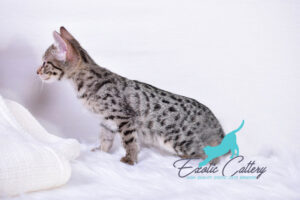 Are Savannah Cats Good Pets?
Are Savannah Cats Good Pets?
Yes, Savannah cats can make excellent pets, but they are not for everyone. Their high energy levels and need for stimulation mean they require more attention and interaction than many other cat breeds. If you’re looking for a low-maintenance, laid-back cat, the Savannah might not be the best fit. However, if you enjoy an active lifestyle and want a cat that can keep up with you, a Savannah cat could be the perfect companion.
How Much Does a Savannah Cat Cost?
The cost of a Savannah cat can vary widely depending on the generation and the breeder. F1 Savannahs, which are closest to their wild ancestors, are the most expensive, often costing between $10,000 and $20,000. Later generations, such as F3 or F4, are more affordable but can still range from $1,000 to $5,000. The high cost is due to their rarity and the challenges associated with breeding them.
What is the Difference Between F1, F2, F3, and Other Generations?
The generation of a Savannah cat refers to how many generations removed they are from their serval ancestor. F1 Savannahs are 50% serval, F2s are 25%, and so on. The earlier the generation, the more wild characteristics the cat is likely to have, such as size, behavior, and appearance. F1 and F2 cats are typically larger and more challenging to care for than later generations, which tend to be more similar to domestic cats in temperament.
Do Savannah Cats Get Along with Other Pets?
Savannah cats are generally friendly and can get along well with other pets, especially if they are socialized from a young age. However, their playful and sometimes assertive nature can be overwhelming for more timid animals. If you have other pets, it’s essential to introduce them slowly and monitor their interactions to ensure a peaceful coexistence.
What Kind of Diet Do Savannah Cats Need?
Like all cats, Savannah cats require a diet rich in protein. Many owners prefer feeding them a high-quality, grain-free cat food, and some even choose to supplement with raw meat to mimic their natural diet. It’s crucial to consult with your veterinarian to ensure your Savannah cat’s diet meets their specific nutritional needs.
Caring for a Savannah Cat
Owning a Savannah cat is a rewarding experience, but it does come with specific care requirements:
- Exercise: Savannah cats need plenty of physical activity. Interactive toys, climbing trees, and even leashed walks outside can help meet their exercise needs.
- Mental Stimulation: These intelligent cats need regular mental stimulation. Puzzle toys, training sessions, and playtime are essential to keep them entertained and prevent boredom-related behaviors.
- Socialization: Savannah cats are social animals and thrive on interaction with their human family. They do not do well when left alone for long periods and can become anxious or destructive if they don’t get enough attention.
- Regular Vet Visits: Because they are a hybrid breed, Savannah cats may be prone to certain health issues. Regular vet check-ups are crucial to monitor their health and catch any potential problems early.
Conclusion: Is a Savannah Cat Right for You?
Savannah cats are extraordinary felines that offer a unique blend of wild beauty and domestic companionship. Their striking appearance, intelligence, and energetic nature make them captivating pets for the right owners. However, they require significant time, resources, and commitment to thrive.
Before bringing a Savannah cat into your home, carefully consider:
- Your lifestyle and ability to meet their needs
- Legal restrictions in your area
- Financial implications of ownership
- Ethical considerations of hybrid breeding
For those who can provide the right environment and care, a Savannah cat can be an unforgettable and rewarding companion.
Key Takeaways:
- Savannah cats are a unique hybrid breed with specific care requirements
- They offer an exotic pet experience but come with significant responsibilities
- Potential owners should thoroughly research and prepare before committing to a Savannah cat
References:
- The International Cat Association (TICA). “Savannah Breed Standard.” https://tica.org/breeds/browse-all-breeds?view=article&id=859:savannah-breed&catid=79
- Johnson-Bennett, P. (2011). “Think Like a Cat: How to Raise a Well-Adjusted Cat–Not a Sour Puss.” Penguin.
- Lyons, L. A. (2015). “DNA mutations of the cat: The good, the bad and the ugly.” Journal of Feline Medicine and Surgery, 17(3), 203-219.

